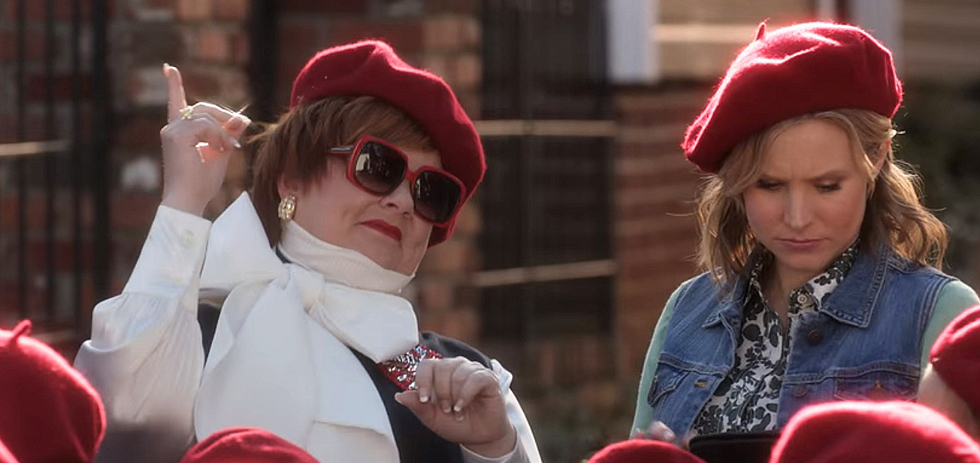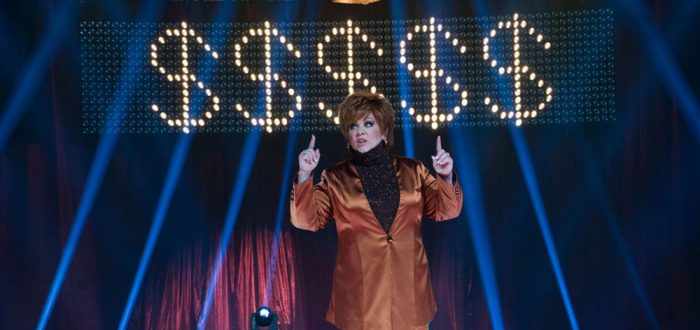
The last few months have seen a fresh wave of goodwill swell towards Melissa McCarthy. Known for bigger than life performances as backwater bumpkins and buffoons in over their heads, McCarthy flew to preeminence in Paul Feig’s 2011 Bridesmaids as its tough-as-nails, shit-talking (and taking) heart. In the intervening years she’s proven herself a bankable commodity and a bona-fide movie star — an anomaly in a superficial industry that, on any other day, might consider her an ordinary character actress. To many, that’s what she still is. There’s no question as to whether her public image — one of a comic who’ll mine the depths of the grotesque for laughs but with the same schtick on repeat — has been somewhat conflated with the characters she plays. It was a viral plea from Vulture’s Mark Harris in a piece titled Why Does Hollywood Keep Disrespecting Melissa McCarthy? that sent those adversaries scurrying away with their tails between their legs. Harris firmly reiterates what are plain facts: in a string of female-led comedies, McCarthy has proven her widespread appeal in box office mettle, with each of her films (which, critically speaking, have about a 50/50 strike rate) earning back their modest budgets almost five times over and wrangling out tough competition.1
McCarthy, the brand, businesswoman and performer, remains a valued presence at the multiplex, despite her occasional misses, but we ought to also recognise that Harris’s call to arms extends mostly to box office commentators who have written condescendingly about McCarthy in the past, and to Hollywood’s studio heads who do little to develop her obvious comedic talent beyond the bare necessities. That plea doesn’t extend to critics, and it doesn’t mean, for all the virtues of having a star like McCarthy rise in a world undeniably stacked against her, that McCarthy is incapable of producing lowest-common-denominator farce supercharged with malicious values and executed in plainly bad filmmaking.
The Boss, her latest collaboration with director and husband Ben Falcone (with whom she co-wrote the script), is a smug, tacky and indefensible cavalcade of free-market conservative values dressed up in innocent buffoonery, too vulgar for children and too dumb for adults, but sly and subtle in its forgiveness of corporate-headed sin. It’s not even limber enough to turn itself over and pass its grotesqueries for satire. It’s yet another comedic stain in a landmark year for sophomoric comedies: Zoolander 2, Bad Grandpa and now The Boss, each of which I’ve endured with gritted teeth and emerged from almost defeated, my brain a tangle of pulverised threads, all too eager to forget.
We meet McCarthy’s latest caricature, the fiery, turtleneck-clad Michelle Darnell — the“47th richest person in America” — in a frazzle of bling and pyrotechnics. She descends onto an auditorium stage riding a gold-emblazoned phoenix rapping DJ Khaled’s “All I Do is Win” before preaching some meaningless self-help to an auditorium of impressionable capitalists. That sets a low standard for the film, which vacillates between tiresomely bawdy and offensive, Falcone stringing set piece after set piece of brazen theatrics together with blocs of poorly edited improvisatory dialogue, each barely humorous exchange protracted beyond justification. After Darnell is briefly imprisoned for insider trading, she’s spat into the home of lowly assistant Claire Rawlins (Kristen Bell), who, for reasons that defy sanity, lets her live there. While Claire goes to her low-paying desk job everyday to support her young daughter Rachel (Ella Anderson, the film’s best asset), she charges the down-on-her-luck Darnell with taking Rachel to her weekly Girl Scout meetings. It’s there that the film gets ideologically ugly.

At the meeting, Darnell is aghast to discover that parents would encourage children to engage in acts of charity, recreation and fundraising for reasons of kindness and personal growth, and quickly spins their cookie-selling into a corporate enterprise. Throughout, the humour spans from offensive (teasing a preteen girl for giving off a supposedly lesbian vibe) to plain immature (the surprisingly flexible Darnell flashing her bits to the innocent Rachel while shaving), but it reaches a hollowing nadir when Darnell and another group of parents and girls led by Annie Mumulo (who co-wrote Bridesmaids with Kristen Wiig) take to the streets to brawl in a violent montage that’s edited to make us want to cheer — it feels like an extension of Taylor Swift’s poisonous girl-squad politics, women battling snidely against each other as pop-cultural currency rains down upon them. What’s most disturbing is that we’re positioned to see Darnell’s avariciousness as some kind of aberrant corporate feminism. Meanwhile, a tangential plot about Darnell’s arch-nemesis Renault (Peter Dinklage, who should refrain from comedy in the future) simmers on the backburner, only to be lazily revived when the film needs its convenient resolution.
The Boss has you waiting expectantly for the inevitable third-act mea culpa, wherein Darnell registers her malformed folly and the toxicity of the message she’s preaching to that small squad of young, newly-anointed neoliberals. You expect her, through the power of Claire’s unquestioning generosity, to feel sympathy, to retract her self-serving morals and restore a vestige of kindness to the world she’s forcefully blustered into. Not so. The Boss, like many a modern comedy that doesn’t know how to end without retracting everything that came before, resolves itself with a tawdry genre parody, in this case a heist sequence set atop Renault’s skyscraper, Darnell flailing about in a parade of self-effacing slapstick to distract us from the fact that we’re being asked to side with a amoral money-grubber whose worldview points inwards.
So where is her atonement? That comes at the film’s outset, in 1975 at the Blessed Sisters of Mercy orphanage. We see Darnell transform from an innocent little girl into a cantankerous individualist as she’s adopted and rejected by a slew of families. By the end of the montage her emotional safeguard has crystallised into a lifelong ideology: “I don’t need anybody. I’m going straight to the top.” But The Boss isn’t telling us that corporate greed is born in childhood neglect — that’s not true, but The Boss isn’t smart enough even for that thrift-store psychology. When, at the end of the film, the Rawlins’ adopt Darnell into their own family and home, their venture a success thanks to her business savvy, we’re supposed to feel glad that she’s found a sense of familial belonging. She’s not reformed, she’s assimilated. The Boss is an undoubtedly silly movie, so much so that it almost feels wrong to mine it for meaning at all, but it’s resolutions are too injurious to ignore.
There’s also a temptation, with a film as densely populated with female talent as The Boss, to grin and cheer blindly for feminism in any of its permutations. Just like Bette Davis and Barbra Streisand before her, McCarthy’s success is undoubtedly a boon for the striking and unconventional in Hollywood, and her corporate and industrial strides should certainly be applauded. McCarthy, like Darnell, has earned the right to make her own business decisions, and here she’s chosen to make a bad comedy that glorifies the Trumps of the world. Sure, let’s cheer for Melissa McCarthy, but for goodness sakes, let’s bury The Boss.
